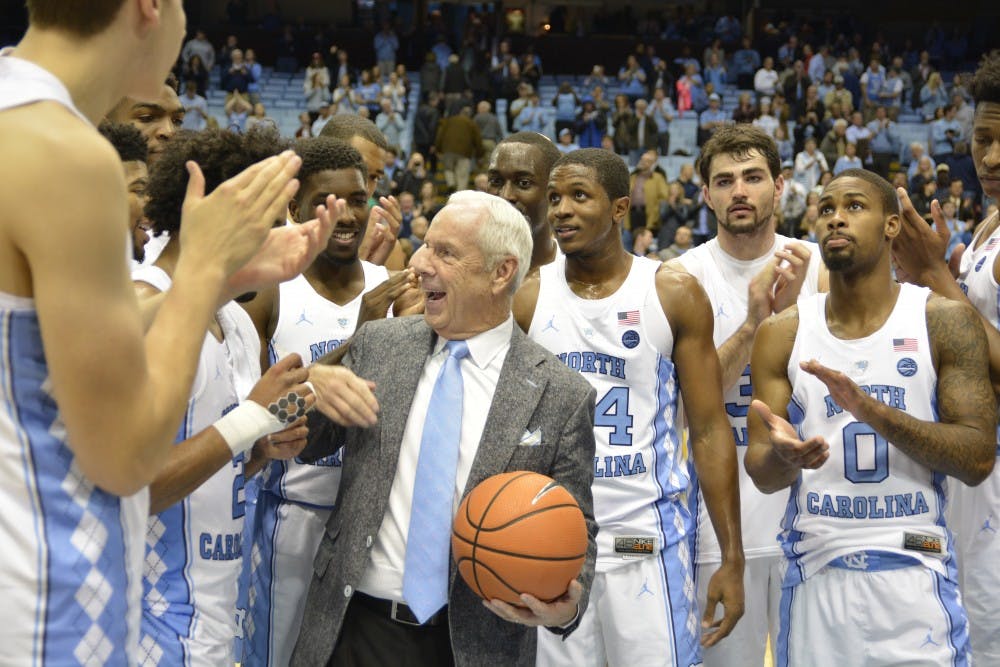For one, the rebounding margin tends to tip the scales in an otherwise even contest, because it controls how many scoring opportunities each team has. Naturally, the more offensive rebounds you obtain, the more chances you have to score; the more efficiently your defense rebounds, the less chances your opponent has to score.
For another, by virtue of his position as a coach who gets first pickings in a recruiting pool that only has so many 6-foot-10 forwards, Williams prefers to play two big men at a time to get the opposing team’s size into foul trouble. In theory, the tactic should expose a matchup problem that North Carolina would exploit at some point down the stretch of a game.
While Williams didn’t completely abandon his basketball principles at the origins of North Carolina’s four-game ACC win streak when he replaced perimeter scorer Johnson in the starting lineup for first-year forward Garrison Brooks, it was surprising.
He won’t call it a death lineup. He also probably won’t say that he prefers it this way. But since Johnson and Pinson are big and active enough defenders — and good enough rebounders (UNC ranks No. 1 in rebounding margin in the country) — Williams can tolerate starting the small-ball lineup.
"Tolerate," of course, being the operative word.
Tightening the rotation
In the 2006-07 season, it wasn’t until sophomore Bobby Frasor suffered an injury that first-year Ty Lawson took the reins as the team’s starting point guard. In Desmond Hubert’s junior season, the big man started 18 of 36 games, and sometimes only played the opening few minutes and never returned to the court.
That’s all to say this: Williams will not overreact to an aberration of circumstances. He will not change his rotation until a longer trend establishes itself.
His principle of sticking to a rotation often leads to lending valuable, substantial minutes to reserve players.
“Some coaches are very comfortable playing five or six guys,” Williams said in a press conference earlier this season. “I’m just not doing that.”
He elaborated: “I want to play guys because they deserve it, because it will help them long-term, because I’m trying to run a program and not just one year.”
It complements his team’s fast-paced style of play. It prepares players for possible future circumstances. And, normally, it's a luxury Williams is able to afford.
To get the day's news and headlines in your inbox each morning, sign up for our email newsletters.
But the leash has shortened this season.
In the first half of Saturday afternoon’s contest, only six Tar Heels put up any shot attempts. At the end of the contest, those same six were the only players who played more than eight minutes — a statistic that starkly contrasts with the fact that 11 Tar Heels are averaging more than eight minutes a game this season.
The starting five have been consistent contributors in the scoring column. Against Georgia Tech, they scored 65 of North Carolina’s 80 points. Against Virginia Tech, the starters scored 57 of the team's 69.
The Tar Heel bench, of course, is a bit more unpredictable. First-year forward Sterling Manley was the non-starter who made an impact on Saturday’s contest, going 4-4 from the field with nine points and adding three rebounds.
Pinson said postgame that his team has been lucky that someone off the bench has made an impact in North Carolina’s wins. When asked why Manley got the call from his coach today, the senior shrugged.
“(It’s) whoever’s playing better,” he said. “He’s playing well right now. He’s out there being active, affecting shots and getting on the offensive boards, and that’s how you stay in the game.”
Even with Manley’s fruitful surprise, though, it’s clear North Carolina’s rotation is getting tighter and tighter. In the Tar Heels' next game, Manley only saw the court for eight minutes — even after his breakout performance three days before.
And as Williams has mentioned earlier this year: Joel Berry II’s average playing time of 32.8 minutes and Kenny Williams' of 30.4 over the past five games is not sustainable — especially throughout a rigorous postseason, playing multiple games in one weekend.
Shooting the deep ball
After the game Saturday, Coach Williams offered an off-the-cuff praise veiled in a criticism.
“Hopefully we’ll shoot the ball better,” he said after Saturday’s game, scanning the box score in front of him, “because I think we could possibly be the best shooting team I’ve ever had, but we didn’t show it today.”
Williams demands inside-out basketball (and historically has compared the 3-point shot to “fool’s gold”) but this year, there’s a clear emphasis on the “out.” In its winning stretch of four prior to North Carolina's loss in Blacksburg, UNC had shot 25 threes on average — nearly three attempts above the season average.
Justin Jackson returned to the Smith Center on Saturday for his journey to be officially honored at halftime. When both teams broke for the locker room, Williams stayed behind and offered some words to introduce the 2017 ACC Player of the Year.
“For three years, I was one of the luckiest guys in the world,” his voice echoed, “because I got to coach Justin Jackson.”
It’s true. The lengthy, slashing junior’s presence — tagged with four competent big men, a senior point guard and an NCAA Tournament Most Outstanding Player — spoiled Williams for three years. Back then, he could always dive deep into the bench if necessary, or play three big men at a time. He didn’t have to deviate from his traditional ways.
But now, in Williams’ 30th season as a head coach, he’s having to make adjustments that he never really has before.
And, at least for now, it’s working.
@alexzietlow05
@DTHSports | sports@dailytarheel.com



